In a world where humanity has flourished and advanced, the environmental cost has often been overlooked. The 2022-2 version of the International Union for Conservation of Nature (IUCN) Red List of Threatened Species reports that 42,100 of all assessed species are threatened with extinction. This includes animals, plants, and fungi.
According to the World Health Organisation, approximately 80% of wastewater from human activities is released into water bodies, contributing to waterborne diseases and negatively impacting aquatic organisms. Similarly, the World Wildlife Fund reports that freshwater ecosystems have faced a staggering decline of about 83% in the last 50 years, largely due to habitat destruction and alteration often exacerbated by activities like mining.
The Food and Agriculture Organisation of the United Nations, also estimates that over 30% of the world’s fish stocks are currently being exploited at unsustainable levels, affecting both aquatic biodiversity and the livelihoods of communities dependent on fisheries.
In spite of these, the world aspires to stabilise the decline in biodiversity and put nature on the path to recovery in the spirit of sustainability by 2030, as contained in the IUCN’s 2017-2020 Report.

A Global Perspective on Sustainability and Conservation
Globally, the urgency of conserving biodiversity has gained momentum. Initiatives like the United Nations’ Sustainable Development Goals have underscored the importance of safeguarding life on land and underwater. The Convention on Biological Diversity also emphasises the significance of conserving ecosystems and promoting equitable sharing of benefits derived from biodiversity whilst fostering sustainable practices, from reforestation and ecosystem restoration, to advocating for renewable energy sources.
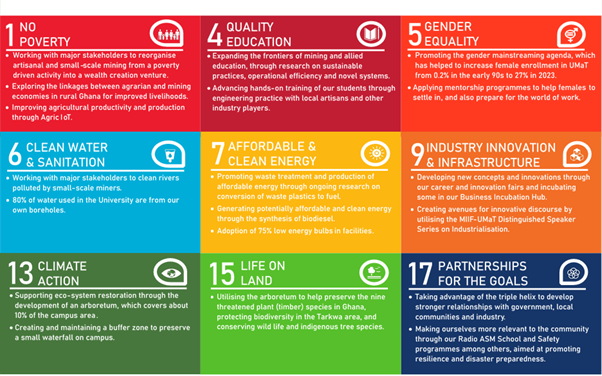
Ghana’s Unique Context
Nestled in the heart of West Africa, Ghana’s rich natural heritage is a source of pride and a responsibility. The nation’s diverse ecosystems, such as the lush rainforests of Kakum National Park to the coastal habitats, support a multitude of species.
However, Ghana faces challenges of deforestation, illegal mining, illegal wildlife trade, and natural habitats degradation. The result is the IUCN’s recent assessments highlighting the decline of certain species within Ghana, urging immediate attention. Among them include pangolins, which has seen a significant decline due to hunting. For example, from 2016 to 2019, authorities in Ghana seized over 31,000 pangolins, both dead and alive. Within the same period, the African forest elephant population, which is found in West Africa including Ghana, declined by around 65%.

Logging in the Upper Guinea Forests of Ghana. Photo: Nicole Arcilla
A Call to Action
It is time to reconcile economic progress with environmental stewardship, as the choices we make today will define the legacy we leave for future generations. Conservation initiatives by government such as the national tree planting exercise, sustainable agriculture practices, and protected area management spearheaded by the Forestry Commission, are some measures to restore and preserve Ghana’s rich biodiversity. In this call also lies the role of academia and industry.
Role of Academia
In an article in the 8th March 2023 Edition of the Daily Graphic, on interventions from academia for Ghana’s mining sector, the writer highlighted a novel eco-friendly gold pretreatment process leading to an increase in gold recovery, with negligible harmful effect on the environment. This exemplifies the several ways academia can promote environmental sustainability to address ecological challenges by conducting research, educating and equipping society, fostering innovation, and informing policies. Thus, the University of Mines and Technology (UMaT), Tarkwa, has initiated some activities such as the introduction of new academic programmes, establishment of an arboretum, and the development of the only waterfall in the Western Region, according to the Ghana Tourism Authority.
Academic Programmes
In addition to the Environmental and Renewable Energy Engineering programmes, the upcoming School of Sustainable Development also marks a significant stride towards holistic ecological stewardship and represents a paramount commitment to nurturing environmentally conscious professionals. At the heart of this lies a robust research focus with a blend of rigorous academic and field activities, to equip students to become architects of sustainable landscapes, adept in preserving biodiversity, mitigating deforestation, and fostering regenerative land use.
Arboretum Project
In a multifaceted commitment to fostering hands-on learning and environmental conservation, UMaT has gone beyond academic boundaries to establish a sprawling 31-acre arboretum, which is home to an impressive array of 2,544 plant species, including many that are endangered. It, thus, assumes the vital role of safeguarding and propagating threatened flora in the face of mining-related pressures, serving as a potent bastion for biodiversity conservation, mitigating habitat loss, and carbon sequestration. Again, it is envisioned to be a tourist attraction for the Tarkwa Municipality in future.
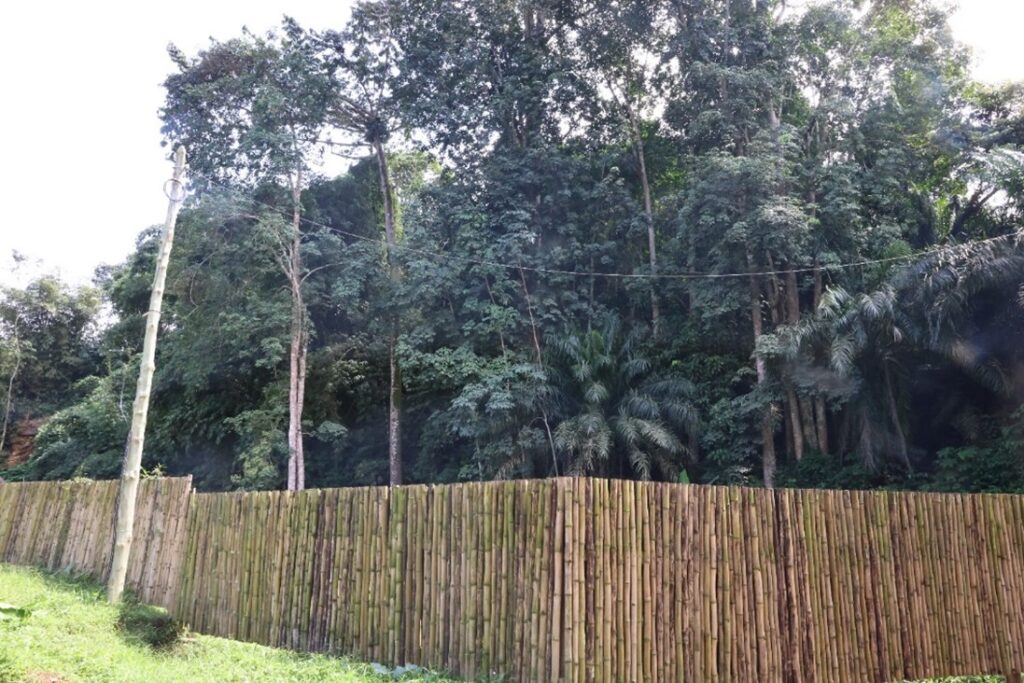
A protected area on the University’s Campus
Waterfall Project
To achieve a convergence of nature, education, and tourism, UMaT in collaboration with the Ghana Tourism Authority has embarked on an eco-conscious waterfall project which would integrate a canopy walkway. Its cascading beauty would contribute to enhanced air quality through the dispersion of negative ions, provide vital habitat for a diverse array of species, promote biodiversity and ecological balance. As the waterfall project unfolds, driven by the spirit of educational tourism, it stands as a testament to the University and the Ghana Tourism Authority’s joint commitment to nurturing environmentally conscious individuals and showcasing that sustainable development, enriching educational experiences, and responsible tourism can harmoniously coexist.
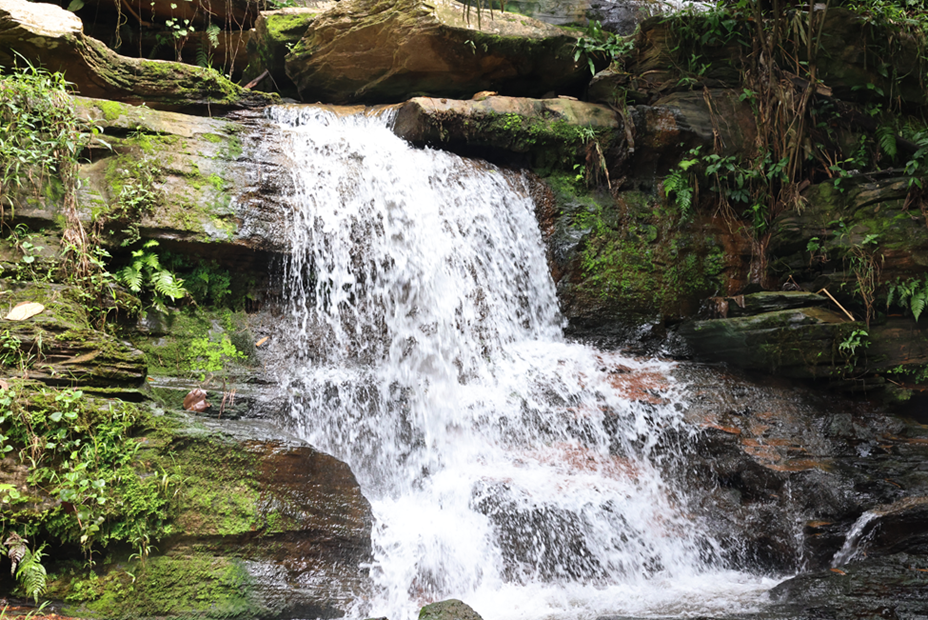
A Section of the Waterfall. Photo: Audio-Visual Unit
Role of Industry
In a remarkable Triple Helix Approach comprising academia, industry, and government, these projects (waterfall, arboretum) have been bolstered by the steadfast support of renowned mining entities like Goldfields Ghana Ltd., Tarkwa; Anglogold Ashanti, Ltd., Iduapriem; (AAIL), Ghana Manganese Company Ltd. (GMC), Nsuta; and Deeprock Ltd, Tarkwa. These companies have not only provided financial backing but have also contributed resources to bring these projects to fruition. Goldfields, in particular, has demonstrated its commitment to environmental well-being by establishing Water and Sanitation committees (WATSAN) in the local communities of its operations. The Committees’ role encompasses safeguarding water resources, and enhancing sanitation. It has also instituted a Community-Led Total Sanitation (CLTS) programme that empowers residents to address sanitation challenges within their communities, whilst AAIL and GMC conducts monthly water testing to ensure water quality for the communities within their areas of operations respectively. This remarkable coalition stands as a testament to the power of collective commitment in fostering responsible development and environmental sustainability.
Similarly, Newmont has since 2014, committed to integrating biodiversity and ecosystem considerations into its business, by conducting biodiversity risk assessments, which provide strategic direction for conserving species of concern, minimising disturbances and restoring disturbed habitats. Its Biodiversity Management Standard outlines the company’s approach to managing and mitigating biodiversity risks, achieving no net loss and providing net gain, when possible, of key biodiversity values.
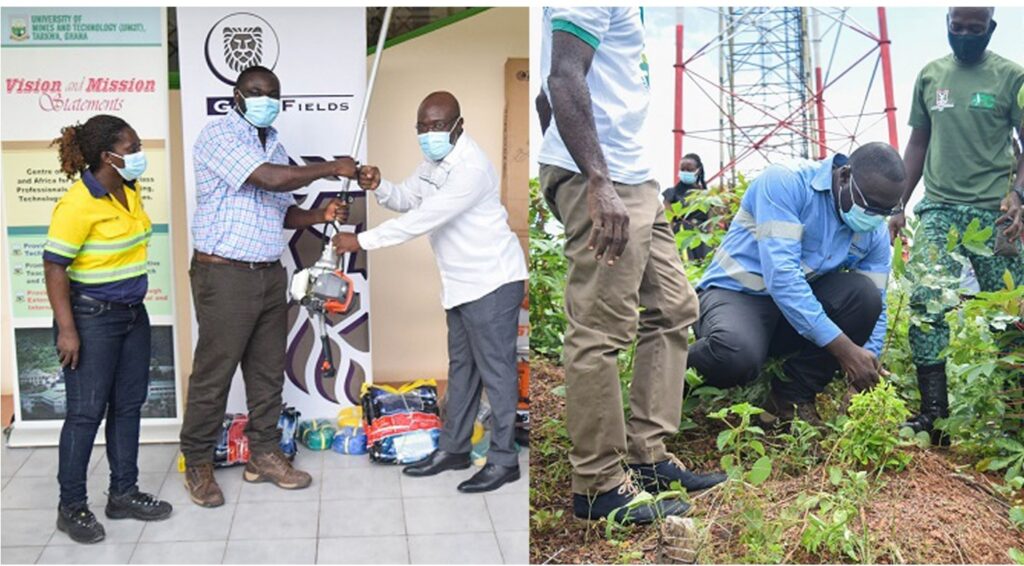
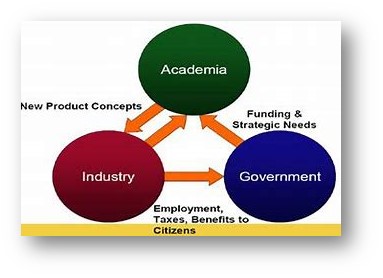
Conclusion
In nature’s diversity lies our future. Therefore, Ghana’s commitment to sustainability through initiatives like the UMaT’s arboretum, waterfall projects and academic programmes, government tree planting exercise as well as initiatives by industry, demonstrates that responsible development, and education can harmoniously coexist, offering hope for a more sustainable and biodiverse future.
Author: Michael Bremfi (Business Development Manager and Marketing Communications Specialist – University of Mines and Technology, Tarkwa)
Email: mbremfi@umat.edu.gh
Tel. 0207567680
